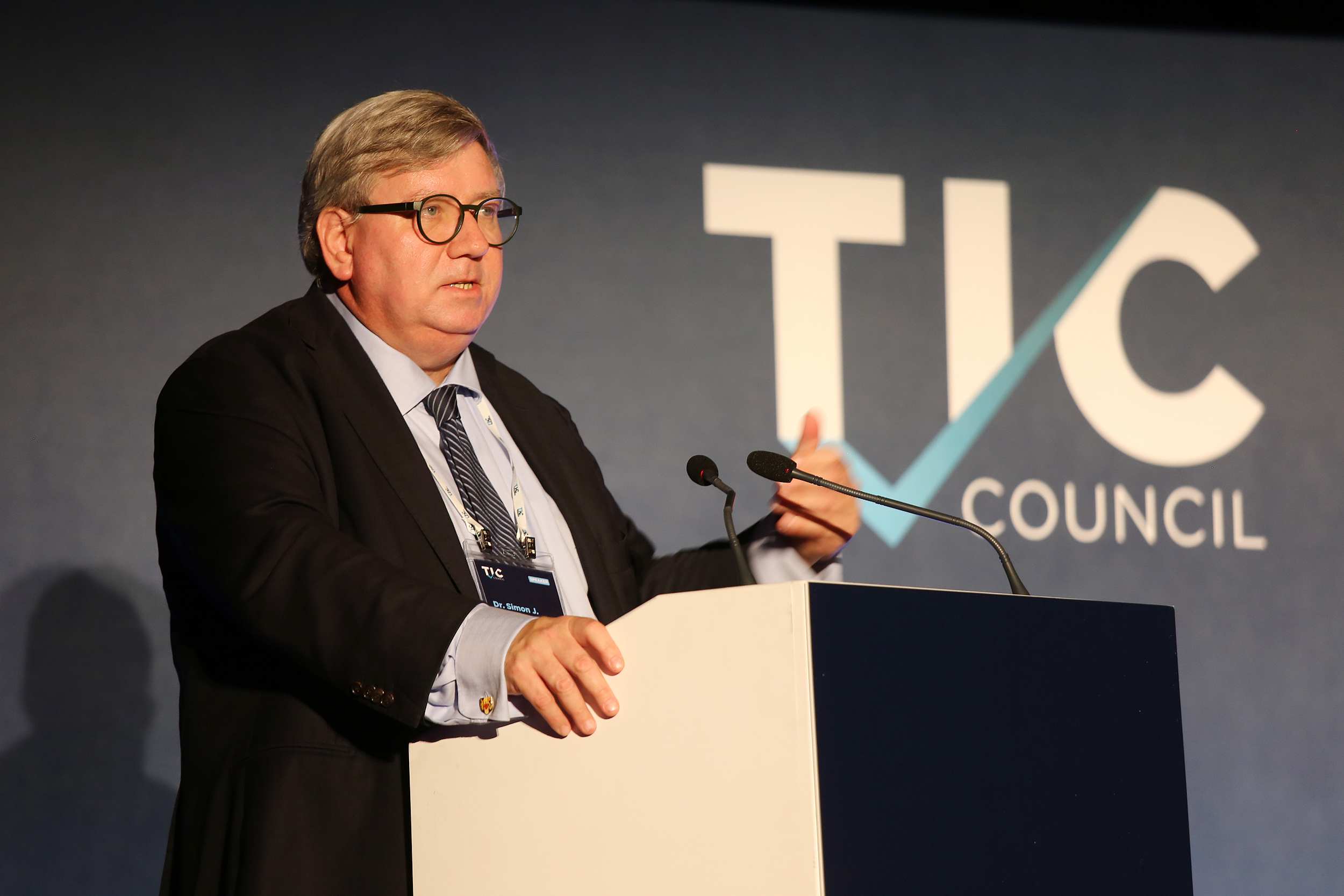TIC Council’s Annual Summit returned to Brussels with a timely theme: Post-Globalisation: New Rules of the Game. Bringing together leading voices from policy, industry, and international institutions, the 2025 edition explored how trade, technology, and trust are evolving in an increasingly fragmented world.
Now a staple in the TIC Council’s calendar, the summit provided sharp insights into everything from AI and digital regulation to shifting geopolitical power. Through keynotes, panels, and networking, one core message rang clear: while the rules may be changing, cooperation, credibility, and quality remain indispensable.
The Next Chapter in Global Trade
Keynote by Simon J. Evenett, World Economic Forum
 Opening the summit, Professor Simon Evenett challenged the narrative of global trade’s demise. In a sweeping analysis, he argued that while protectionism and geopolitical tension persist, cross-border trade remains essential - and needs stronger institutions to endure.
Opening the summit, Professor Simon Evenett challenged the narrative of global trade’s demise. In a sweeping analysis, he argued that while protectionism and geopolitical tension persist, cross-border trade remains essential - and needs stronger institutions to endure.
Evenett cited recent US-China developments as both a warning and a lesson: while devastating tariffs were avoided, global trust remains shaky. He underscored that trade distortions now impact over 80% of flows, revealing a system long in need of repair.
Looking ahead, Evenett outlined four futures: renewed multilateralism, regional blocs, a decentralised mesh of trade ties, or outright economic warfare. In each, agility and trust are paramount - and the TIC sector is well-positioned to deliver both. His closing thought: “The rules of the game are changing, but trade is a fundamental human instinct. We must build the bridges to sustain it.”

Europe’s Tech Reality Check
Keynote by Cristina Caffarra, Competition Economist
Cristina Caffarra delivered a hard-hitting critique of Europe’s tech trajectory. Despite early leadership in antitrust action against Big Tech, she argued, results have been negligible. Landmark cases fizzled, and the EU’s pivot to regulation hasn’t broken the dominance of digital giants - or empowered local SMEs.
The deeper issue? Europe’s economic model may be unsustainable. Caffarra echoed former ECB President Draghi’s warning and urged a shift from regulation toward innovation. With AI advancing rapidly and geopolitical uncertainty rising, Europe risks becoming a permanent tech follower. “The future,” she concluded, “depends on building, not just regulating.”

Lightning Round: Can Geopolitical Partners Level the Playing Field?
With Dr. Michael Fübi and Dr. Laurie E. Locascio, Moderated by Jennifer Baker
In a dynamic exchange, Dr. Fübi and Dr. Locascio tackled the challenge of global cooperation in a divided world. Drawing on her experience with the CHIPS Act, Dr. Locascio described a policy rooted in survival, not politics. Yet, both experts warned that excessive reshoring risks shrinking economies.
Their shared message: the TIC sector acts as a global stabiliser. Quality infrastructure is more than compliance - it's a confidence builder. But it must evolve quickly, especially in the face of AI. “We need to go digital, and we need to go faster,” said Dr. Fübi. Still, optimism prevailed: technical collaboration can endure even when geopolitics divide.
The Future of Quality Infrastructure
Panel with Christoph Winterhalter, Maureen Logghe, Jennifer Scanlon, Omar Dhahrer, and Tim Merci
Moderated by Jennifer Baker
The panel offered a deep dive into the future of quality infrastructure (QI) amid digital disruption, climate pressures, and geopolitical flux. Jennifer Scanlon set the tone: “Innovation without safety is failure.” The QI community, she stressed, must communicate its relevance more clearly.
From Christoph Winterhalter’s call for global cohesion to Maureen Logghe’s emphasis on inclusive standard-setting, the panel spotlighted cooperation as key. The need for digital transformation was echoed by Tim Merci and Omar Dhahrer, who pushed for faster, simpler, and smarter processes.
Data integrity and AI were hot topics. “You can’t outsource judgment to AI,” Scanlon warned, reinforcing the role of human oversight in a tech-driven world. The panel made it clear: good regulation, rooted in science and trust, is essential for progress.
Concluding Remarks: Trust at the Speed of Innovation
Closing the event, Dr. Michael Fübi offered a clear message: in a fast-changing world, QI must evolve - and fast.
From digitisation to geopolitical uncertainty, the challenges are many. But the goal remains the same: enabling trust. Whether in AI systems, global supply chains or emerging markets, the TIC sector has a vital role to play in making innovation safe, scalable and globally accepted.
Dr. Fübi acknowledged that expectations are rising, and the pace of change is accelerating. But QI, he said, is ready to meet the moment. “We are committed to speed up - and to deliver trust.”
As the sector adapts, one thing is clear: the rules of global trade may be shifting, but the importance of trusted standards and technical cooperation is more relevant than ever.
We extend our sincere thanks to our sponsors Scope AI, Strativ Group, Checkfirst, and Intact for their support of this year’s summit.